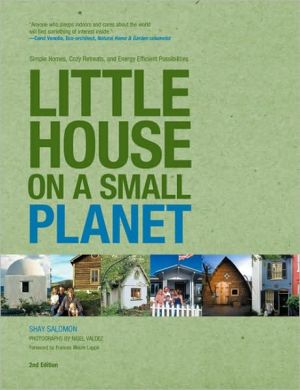

 |

|

The average rating for Little House on a Small Planet: Simple Homes, Cozy Retreats, and Energy Efficient Possibilities based on 2 reviews is 3.5 stars.
Review # 1 was written on 2008-04-08 00:00:00 David Renegar David RenegarI should have known I was in for trouble when I started seeing words like "earthship". This book actually made me depressed about how much simplicity I can't even afford. It was kind of preachy and it made a lot of smug assumptions about people who want to live in something bigger than a garden shed. Maybe it's just that I'm an introvert, but asking me to live with a pile of people in a house with minimal privacy and elbow room is a mass murder waiting to happen. The house shapes and building materials are fairly diverse, but the people featured in them are not. There is really only one working-class family. Most of them are people with at least some degree of financial or occupational flexibility: Freelancers, telecommuters, couples who can afford to have one spouse stay home or work part-time, people whose occupations provide sufficient income at reduced hours. A bunch of them even seemed to have families or friends who could give them interest-free loans. If you're single, comparatively low-income, and have a job that requires fixed hours and that you be physically present at your workplace, you're largely out of luck. Most of the houses are in suburban, small-town/bedroom community, semi-rural, or rural areas where housing costs are often lower but where there are fewer jobs. It seems to assume you live in a temperate climate. I live on the Gulf Coast. Food molds or rots immediately in the summer, and "winter" temperatures can be anywhere from 20 to 80. We even refrigerate bread; I can't do with a dorm-room refrigerator. Several of the small older houses featured cost twice as much as my parents' large house (which, yes, they had to buy to get us into a good school district and safe neighborhood. Such is life in a major metropolitan area). It's a nice thought, but we can't all live on Walden Pond. If we all move to the exurbs, we just contribute to urban sprawl, anyway. I was a bit surprised that she was so quick to advocate converting the garage to house space, even after you've decluttered. Unless you can get rid of your car, how about putting the car back into the garage? Garaged cars last longer, which reduces pollution (you're not replacing as many parts and you can drive the car longer before replacing it). This book is not very useful if you don't have a lot of lifestyle flexibility. If you live in a city and if you don't fall into a comparatively privileged income level, only the superficial stuff, such as buying a more energy-efficient fridge, applies. It's not that I'm saving for my first McMansion. Really, my homeownership dreams are more in the line of a single-wide on an acre lot (which would actually fit in nicely with this book, especially if it was an older trailer than had already off-gassed), but almost none of this was within my reach. |
Review # 2 was written on 2008-05-15 00:00:00 Victor Robichaud Victor RobichaudI was interested in small houses before I found this book, but now that I'm reading it I am convinced that small houses are the way to go. In the US it seems like having a small house has become a sign of deprivation, and it's hard to get around that mental block or to believe - really believe - that less is more. And having a small house would mean, logically, having less stuff. Less stuff can translate into less time cleaning, more time to do other things, more energy to spend on the activities and the people you really enjoy. Smaller houses may also mean less money in heating and cooling costs, less money on rent or mortgages which means more money to save, travel, or simply the freedom not to work full-time. Small houses are often greener than large ones; smaller footprint, lower energy usage and hopefully a more mindful consumerism, which means less waste. Small houses. Yeah. |
CAN'T FIND WHAT YOU'RE LOOKING FOR? CLICK HERE!!!